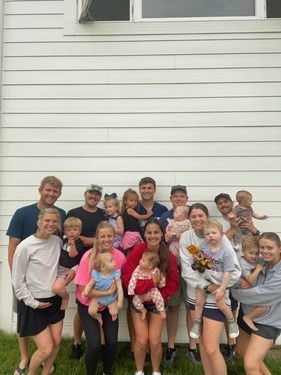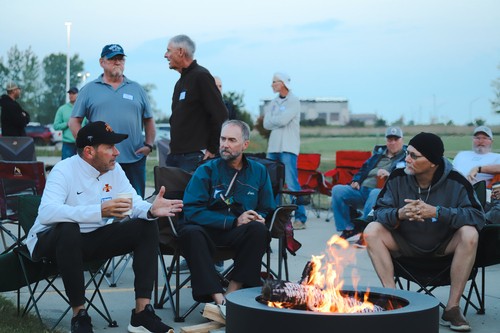Welcome!

Men's Leader, Will Herron
Group Facilitators of The Ridge,
First off, I want to say just how grateful I am for each one of you. The time and effort you put into meeting with others and facilitating crucial conversations does not go unnoticed. Each of you have displayed a faithfulness to those in your care, showing up consistently to guide, inspire, and challenge. So thank you for all you do!
In an effort to honor the Biblical emphasis on shepherding people well (as well as a recognition of the influential nature of the group facilitator role), we have put together some guidelines for facilitating groups at The Ridge. Our heart in producing these is to provide what we see as the best foundation for fulfilling this important Biblical role. Please don’t hesitate to reach out if you have any questions on anything included below.
Thank you again for all do you to help raise up disciples of Jesus at The Ridge!
Will Herron
Director of Discipleship
First off, I want to say just how grateful I am for each one of you. The time and effort you put into meeting with others and facilitating crucial conversations does not go unnoticed. Each of you have displayed a faithfulness to those in your care, showing up consistently to guide, inspire, and challenge. So thank you for all you do!
In an effort to honor the Biblical emphasis on shepherding people well (as well as a recognition of the influential nature of the group facilitator role), we have put together some guidelines for facilitating groups at The Ridge. Our heart in producing these is to provide what we see as the best foundation for fulfilling this important Biblical role. Please don’t hesitate to reach out if you have any questions on anything included below.
Thank you again for all do you to help raise up disciples of Jesus at The Ridge!
Will Herron
Director of Discipleship



Guiding Values
Community
Where people are welcomed, heard, and valued. Where meaningful and mutually supportive relationships are developed.
Support
Where needs are recognized and responded to.
Change
Where people can experience Christ-like transformation through the truth of God’s Word and the work of the Holy Spirit.
Get Connected
If you're interested in getting connected to a group or would like to learn more, click on the “Join a Group” button below, and a member of our team will reach out shortly.
Curious about news, events and ministry offerings? Sign up to receive our Men’s Ministry eNewsletter. You can also follow our Men’s Ministry Facebook page to view upcoming events, receive words of encouragement and connect with other men of The Ridge.
Curious about news, events and ministry offerings? Sign up to receive our Men’s Ministry eNewsletter. You can also follow our Men’s Ministry Facebook page to view upcoming events, receive words of encouragement and connect with other men of The Ridge.
Facilitator Guidelines
All Ridge Group Facilitators Should Hold to the Key Tenets of the Christian Faith
There are central tenets of the Christian faith that we believe are essential belief sets for any Ridge Group facilitator. These beliefs include:
- the absolute authority and inerrancy of Scripture
- the divinity of Christ
- the physical resurrection of Christ
- salvation by grace alone
- the equal standing of Father, Son, and Holy Spirit
Resource Content Should Mirror the Values and Beliefs of The Ridge
While we will always make recommendations for group studies, we are aware that many groups choose their own study content. We are also aware that there are areas of the Bible that cause some disagreement among believers. These disagreements generally stem from the interpretation and application of certain scriptures. We are open to conversation on a variety of these areas including infant baptism, eschatology, the timeline of creation, degree of separation from worldly practices. However, there are certain subjects about which The Ridge does hold an official stance. Examples of this include the affirmation of women in a teaching role, the definition of marriage as a heterosexual union, and the active role of the Holy Spirit in the world today.
While all group members may not agree with these beliefs, we still expect study resources to be consistent with them.
A list of the values that shape and direct our church ministry can be found here.
While all group members may not agree with these beliefs, we still expect study resources to be consistent with them.
A list of the values that shape and direct our church ministry can be found here.
Group Facilitators Must Hold to the Supreme Authority of Scripture
Also, while we may apply teaching from the Bible to our cultural context/personal experience, we expect group facilitators to be mindful about using or encouraging these as equally authoritative voices when interpreting/studying the Bible.
Group Facilitators Must Publicly Represent the Values and Beliefs of The Ridge
When someone assumes a group facilitator role at The Ridge, he/she is representing The Ridge both in and outside of the church. Group facilitators will be expected to uphold The Ridge’s values/beliefs while also living publicly and privately in a manner consistent with those values/beliefs.



FAQs
#1 | How do I facilitate good discussion?
Perhaps one of the best ways to think about good discussion in a group is to visualize someone in the group with a ball. They then pass the ball to another group member, who then passes it to another. They then may pass it back to the original carrier who passes it to a different group member. Ideally, conversation would operate this way in the group setting. Notice that no one member dominates conversation; rather, the conversation is distributed evenly.
While this is the ideal, we recognize that groups are made up of lots of different personality types. Some share with ease (sometimes too much ease!) while others remain quiet. It is the role of the group facilitator to ensure a balance of conversation in the group — tempering the more vocal members of the group and encouraging quieter members to have their say.
While this is the ideal, we recognize that groups are made up of lots of different personality types. Some share with ease (sometimes too much ease!) while others remain quiet. It is the role of the group facilitator to ensure a balance of conversation in the group — tempering the more vocal members of the group and encouraging quieter members to have their say.
#2 | How do I encourage a quiet group member to share?
Groups are naturally made up of different personality types. For quieter group members, it can be a struggle to get to the point of opening up and sharing their thoughts and experiences. Often, this only comes after they have begun to build solid relationships with other group members. As a facilitator, be patient with quieter group members. Continue to build up relationship and trust with them outside of the discussion time. The building of trust can lead to a greater level of comfort to share in the group.
It’s important to also be aware that some may feel they have little to bring to the group discussion, particularly when it comes to the Bible/spiritual matters.
Continue to reinforce to the group that this is a safe place to voice observations, questions, doubts about faith and the Bible. No question/observation is deemed irrelevant or too elementary. After all, having a place to voice our questions, challenges, doubts, etc. is one of the main ways we can grow!
It’s important to also be aware that some may feel they have little to bring to the group discussion, particularly when it comes to the Bible/spiritual matters.
Continue to reinforce to the group that this is a safe place to voice observations, questions, doubts about faith and the Bible. No question/observation is deemed irrelevant or too elementary. After all, having a place to voice our questions, challenges, doubts, etc. is one of the main ways we can grow!
#3 | How should I handle a very talkative group member?
Getting a balanced discussion dynamic in your group is essential to keeping everyone engaged. If one group member tends to dominate the conversation, most likely you’ll start to lose people — either by checking out mentally or physically leaving the group. When one person dominates, this sends a message to other group members that their thoughts and opinions are not valued. So how do you handle a talkative group member?
Having a conversation with the specific person outside of the group meeting can be helpful. Mention that you appreciate their perspective in the group, but due to the limited timeframe of the group meeting, you also want to make sure others have a chance to share.
If you are in the group setting and someone is taking up a lot of the discussion, try directing the conversation by specifically asking others to share: “Thanks for sharing Tim; so Peter, did you have any thoughts on the passage.” Should the talkative member try to jump back in again after someone shares, kindly redirect the conversation to another group member. The rest of your group will appreciate your firm yet kind direction of the discussion.
Having a conversation with the specific person outside of the group meeting can be helpful. Mention that you appreciate their perspective in the group, but due to the limited timeframe of the group meeting, you also want to make sure others have a chance to share.
If you are in the group setting and someone is taking up a lot of the discussion, try directing the conversation by specifically asking others to share: “Thanks for sharing Tim; so Peter, did you have any thoughts on the passage.” Should the talkative member try to jump back in again after someone shares, kindly redirect the conversation to another group member. The rest of your group will appreciate your firm yet kind direction of the discussion.
#4 | How should I handle disagreement in my group?
While you may find your group holds many similar convictions, it is inevitable that there will be disagreement at some point. When this happens, it is important for people to feel that they can voice opinions without judgment or the possibility of harming their relationship with other group members. It is also important that the facilitator does not strong-arm others into falling into line with his own beliefs.
The Ridge has what we consider to be “primary theology” (e.g. the divinity of Jesus, a physical resurrection, Jesus as the only way to salvation, the supreme authority of the Bible), and facilitators should of course be prepared to explain and defend these beliefs. But there is a lot that falls outside of “primary theology” that group members should be encouraged to discuss, explore and even disagree on. Our role as group facilitators is to set an example of being willing to listen to others’ opinions while humbly sharing/evaluating our own.
The Ridge has what we consider to be “primary theology” (e.g. the divinity of Jesus, a physical resurrection, Jesus as the only way to salvation, the supreme authority of the Bible), and facilitators should of course be prepared to explain and defend these beliefs. But there is a lot that falls outside of “primary theology” that group members should be encouraged to discuss, explore and even disagree on. Our role as group facilitators is to set an example of being willing to listen to others’ opinions while humbly sharing/evaluating our own.
#5 | How do I navigate lack of commitment in my group?
If there is one thing that is discouraging within a group, it’s irregular attendance. There can be lots of reasons why guys don’t show up consistently; perhaps an overly demanding season at work or a difficult situation at home. It might also be that they are finding it difficult to connect in the group or that they have trouble following through on commitments in general.
Whatever the reason, we would encourage facilitators to have a personal (and private) conversation with the group member. Avoid any tone/words that convey a sense of guilt or shame; instead communicate something like “Hey Molly, you’ve been missed at group recently. Is everything going alright?” Hopefully this will provide a path to a conversation about the reasons behind their lack of commitment. If it becomes apparent that the group isn’t really a priority for the individual, remind them of the value that comes from community with others (e.g. accountability, support, challenge etc.), but also highlight that developing those kinds of relationships takes time and commitment. You might then end by asking them if that is something they are interested in pursuing.
It is also worth regularly mentioning to your group the expectation of showing up faithfully and communicating in advance when they need to miss a meeting.
Whatever the reason, we would encourage facilitators to have a personal (and private) conversation with the group member. Avoid any tone/words that convey a sense of guilt or shame; instead communicate something like “Hey Molly, you’ve been missed at group recently. Is everything going alright?” Hopefully this will provide a path to a conversation about the reasons behind their lack of commitment. If it becomes apparent that the group isn’t really a priority for the individual, remind them of the value that comes from community with others (e.g. accountability, support, challenge etc.), but also highlight that developing those kinds of relationships takes time and commitment. You might then end by asking them if that is something they are interested in pursuing.
It is also worth regularly mentioning to your group the expectation of showing up faithfully and communicating in advance when they need to miss a meeting.
#6 | What should I do when a group member has deep needs? (e.g. going through a divorce, depression, suicidal thoughts, etc.)
We want our groups to be a place where guys feel free to share openly about whatever they are walking through. When someone shares something difficult going on in their life, we need to discern what the best next step is for them support-wise. This could be something as simple as checking in with them more frequently in the coming days and months. However, if you feel someone in your group needs a higher level of support than you are able to provide, please reach out to our Men’s Ministry lead, Will Herron, or Women’s Ministry lead, Cheryl Sidler. At The Ridge, we have several next steps for folks walking through difficult experiences, including divorce care, pastoral care and professional Christian counseling.
#7 | How can I encourage group members to pray out loud in a group setting?
Particularly if you are new to faith, praying in a group setting can be intimidating. When it comes to encouraging others to pray in the group, it’s a matter of getting a balance between patience and prompting. We can always ask if anyone would like to pray while remaining patient if no one responds. However, once relationships are better formed within the group, sometimes we have the platform to personally prompt someone to pray.
A simple first step could be asking a particular person to close the group in prayer. If you still feel your group is reluctant to pray, it might be worth talking about it as a group. This may give opportunity to work through any misconceptions or fears about praying out loud in a group. Sometimes we need a reminder that God is looking at our hearts, not the eloquence of our speech. In many instances, simple prayers are the most authentic.
A simple first step could be asking a particular person to close the group in prayer. If you still feel your group is reluctant to pray, it might be worth talking about it as a group. This may give opportunity to work through any misconceptions or fears about praying out loud in a group. Sometimes we need a reminder that God is looking at our hearts, not the eloquence of our speech. In many instances, simple prayers are the most authentic.
#8 | How Can I Go About Multiplying my Group?
Do you feel like the size of your group is making deep connection challenging? Maybe you have some potential group facilitators in your group who are ready to branch out and start their own group? Check out our group multiplication manual for some options on multiplying your group in a healthy way.
